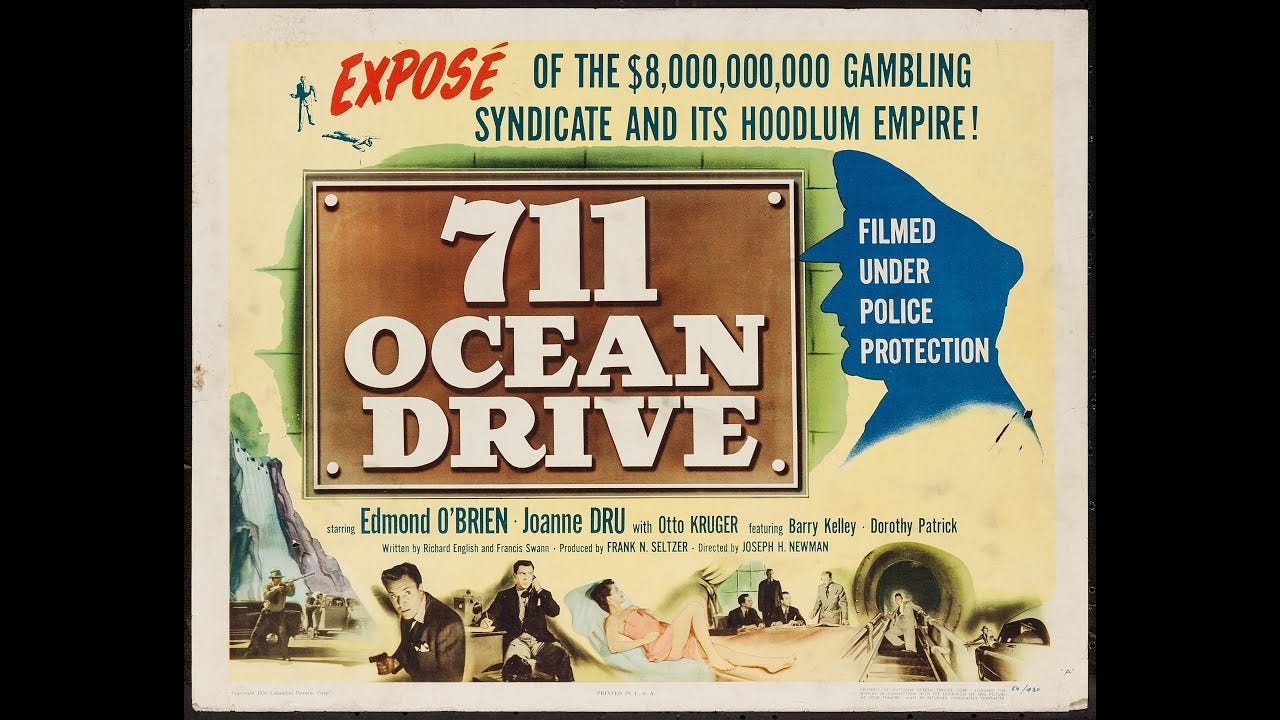Plot: An electronics expert creates a huge bookie broadcast system for his crime boss, and takes over operations when his boss is murdered. His greed leads him on a deadly destructive path.
Directed by: Joseph M, Newman
Written by: Richard English and Francis Swan
Cinematography by: Franz Planer
Studio: Columbia Pictures
Runtime: 1 hour 42 minutes
Eddie Mueller on his Noir Alley intro pointed out this movie is part of a subgenre of “exposé noir.” The ‘50s were full of government officials wanting the public to know they were cracking down on crime. Naturally, the film industry capitalized on this. We’ve already covered a movie in this genre, Port of New York. And like that film, 711 Ocean Drive has statements before and after regarding the legal, criminal, and government nature of the production. I love the disclaimer at the beginning of this movie telling us it almost wasn’t made. It says:
"Because of the disclosures made in this film, powerful underworld interests tried to halt production with threats of violence and reprisal. It was only through the armed protection provided by members of the Police Department in the locales where the picture was filmed that this story was able to reach the screen. To these men, and to the U.S. Rangers at Boulder Dam, we are deeply grateful."
Armed protection? Threats of violence? What on earth was going on behind the scenes? This makes it sound like politicians were getting body parts mailed to their house or strangers approaching them and saying, “I’d hate for you to have an accident.” Is that what they were saying? I did a little digging, and according to a June 15, 1950 Los Angeles Times article, Frank Seltzer, a producer, told a special Senate Crime Investigating Committee his crew was being harassed. He revealed that the crew of the film had encountered pressure from Las Vegas gamblers to cease filming at various locations, including Hoover Dam (formerly known as Boulder Dam), Lake Mead, Palm Springs, Las Vegas, and a notable Los Angeles restaurant. The gamblers were reportedly dissatisfied with the film's portrayal of the intricate scheme of 'past posting.' How often was this happening? When was the last time it happened? Fascinating stuff.
The plot is a fun one. Mal Granger (played wonderfully by Edmond O’Brien) works as a lineman for a telephone company. Outside of some gambling, Mal starts out as a pretty straight-shooter. It’s when his bookie persuades him to help out a racing wire service that things start to change for Mal. Mal’s expertise with electronics make him valuable in the eyes of the gambling syndicate. Granger helps them set up a “past posting” system. Simultaneously, he eyes his boss’ assistant, Trudy. One thing leads to another, and Mal finds himself at the top of the heap. The money and power change him, as well as draws the attention of the law.
Something that struck me while watching this was the role of technology and surveillance. Technology has the potential for both liberation and control. As a telephone lineman, Mal harnesses the power of technology to advance his career. He’s trying to gain a leg up in society, and he has a clear path to do just that. However, he becomes ensnared in a web of surveillance and manipulation. There are dangers of unchecked technological advancement, a timely tale if I ever heard one.
Before watching 711 Ocean Drive, I don’t know how much I had seen Edmond O’Brien. I had seen The Man Who Shot Liberty Valance, The Hitch-Hiker and Seven Days in May. But he wasn’t the star in those movies. 711 is a great showcase for him. He plays the blue collar electrician so well—he’s someone we can root for and get behind. Mal’s descent into the criminal underworld is believable. O’Brien deftly guides us down his path of change and crime.
711 Ocean Drive isn’t a hallmark of noir by any stretch. But I think it helps solidify the genre as a whole. Like many films noir, the film exposes the corrupt underbelly of society, showing us an underworld where power is wielded by those willing to exploit others for personal gain. It reflects the moral ambiguity and ethical dilemmas faced by individuals in a society plagued by corruption and greed. Mal's journey from an honest lineman to a willing participant in criminal activities serves as a cautionary tale about the corrosive effects of moral compromise and the temptations of easy money. A lot has been written about society in the post-war era. And many films explore it more in-depth. But hey, don’t overlook this one. It’s a good time.
It took me a while to get this newsletter out. Sorry it’s been so long! I’ll be better. Hope you’re spending some time in the shadows.
Favorite line-
Mal Granger: Time wounds all heels.
Smoking: 🚬🚬 out of 🚬 🚬 🚬 🚬
Illegal gambling: 🎰🎰🎰🎰 out of 🎰🎰🎰🎰
Femme Fatale: 💃 💃 💃 out of 💃 💃 💃 💃
Trivia:
"Boulder Dam" is actually Hoover Dam. Congress authorized the Boulder Canyon Dam Project in 1931 and, it being traditional to name big federal dam projects after the sitting President, named it Hoover Dam.
As Granger and Chippie drive up to the Liberty Finance office, a sign on the nightclub next door reads "Red Nichols and His 5 Pennies". Red Nichols was a popular jazz cornetist and bandleader in the 1920's and '30's who was staging a comeback in the 1950's. His career is depicted in the biopic The Five Pennies (1959).
The movie was produced by Columbia Studios who owned Gilmore Stadium by this time. It tore down the stadium to build Columbia Broadcasting's Television City, the LA equivalent of New York's Radio City Hall, also owned by CBS at the time.
Links of interest:
The best French films noir of all time (not related to this film, but thought you’d enjoy).







